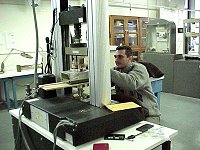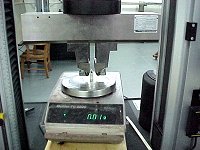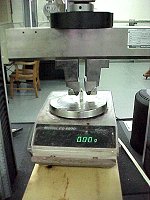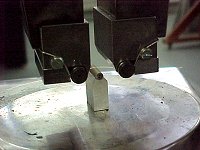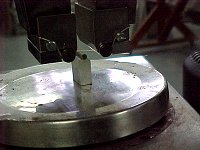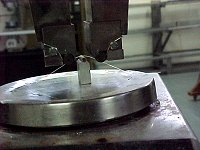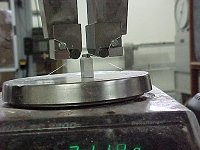Flexure Testing of Glass Fibers
in Materials Testing Laboratory at the University of Missouri-Rolla
Photos by Jeff Thomas, January 18, 2000.
Click on value for raw data and load-deflection curve.
| Flexure Modulus (GPa) | ||||||
| NAP-3 | Silica | Silica McDo | F43 | Silica K Old | ||
| Sample | 1 | 45.69* | 71.60* | 72.99 | 77.07 | 87.45 |
| 2 | 68.50 | 77.23 | 75.74 | 79.89 | 88.71 | |
| 3 | 56.41 | 79.13 | 74.99 | 65.52 | 88.69 | |
| 4 | 67.22 | 78.35 | 75.80 | 68.71 | 91.15 | |
| 5 | 62.97 | 79.35 | 73.88 | 70.19 | 91.00 | |
| 6 | 58.75 | 79.52 | 73.55 | 91.89 | ||
| 7 | 65.72 | 88.98 | ||||
| 8 | 67.27 | |||||
| 9 | ||||||
| 10 | ||||||
| Average | 62.77 | 78.72 | 74.68 | 70.99 | 89.70 | |
| STD | 4.68 | 0.84 | 1.09 | 5.00 | 1.52 | |
Click on image to enlarge.
Derivation of E
From beam deflection theory for 3-point bending,
y = x(3L2 - 4x2)P / 48EINA
where
y = deflection of middle of beam (read by Instron 4469 UTM)
x = L / 2
L = span
P = load (read in grams using gram-scale)
E = flexure modulus
INA = moment of inertia about the neutral axis = pr4 / 4 (for cylindrical samples)
Rearranging,
E = (P/y)L3 / 12pr4
